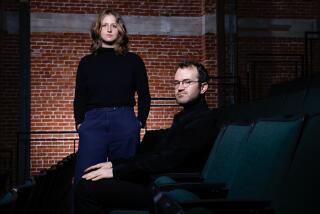Hungarian Film Fest Is a Vital First
- Share via
The wryly amusing “Stracciatella” screens tonight at 9 at the Music Hall as part of the opening night program of the first Hungarian Film Festival, which runs through Thursday.
Judging from the films available for preview, the Hungarian cinema is as vital and engaging as ever, reflecting the wrenching changes wrought by the fall of communism.
Writer-director Andras Kern stars himself in “Stracciatella” as a famous 50ish conductor stricken with a panic attack as he rehearses a concert in Budapest after having spent some years abroad. He’s struck by all the changes that have occurred during his absence, making him aware of time having passed--and of his own mortality. Not helping his self-confidence is that his beautiful, estranged wife is doing splendidly in her own career as a dentist.
After a collapse sends him to a sanitarium for rest and treatment, the conductor is drawn to his attractive young therapist. The point is that for men of such charisma, talent and renown, there are invariably safety nets, yet the conductor becomes aware that he’s reached a stage where life has become a series of “almosts”--as in “almost happy.”
Andras Kovacs’ austere, implacable “The Stud Farm” (Saturday at 5 p.m.) takes us back to a bleak Stalinist 1950 when communism is commencing to crush Hungary in its iron grip.
Jozsef Madaras plays the newly appointed manager of a stud farm along the country’s western border, protected by land mines. The manager is an earnest, outspoken young villager who knows nothing of horses yet has been placed in charge of a group of officers from the old regime--some of them aristocrats, all of them bitter and contemptuous.
The naive manager is slow to comprehend that the workings of the burgeoning Communist bureaucracy conducts itself in an entirely arbitrary manner for its own authoritarian purposes.
“The Stud Farm” records the strangling of truth and freedom of expression, replacing it with a creeping fear and paranoia. (Be warned that there is a brutal sequence involving the shooting of about a dozen dogs.)
Janos Rozsa’s “Good Night, Sweet Prince” (Saturday at 7 p.m. and Sunday at 3 p.m.) is a lively but somewhat callow cautionary tale about a group of young Budapest filmmakers eager to erase the line between fiction and reality in their desire to capture life as it is happening--even if that involves car chases and car theft. The film’s downbeat ending seems more contrived than inevitable, but Szaboics Hajdu is appealing as the film’s shaggy-haired young hero.
Robert Koltai had an international winner with “We Never Die,” in which he played an itinerant salesman, an incorrigible life force who took along his 17-year-old nephew on his travels one summer in the early ‘60s. Unfortunately, Koltai’s “Samba” (Saturday at 9 p.m. and Sunday at 7 p.m.) disappoints in comparison.
Once again Koltai is a bombastic type, a loud, crude small-town ham actor who embarrasses his talented son (Laszlo Gorog). The son is learning to thrive in a minor traveling company when tragedy strikes, seemingly for no other reason than to allow Koltai a noble final scene. “Samba’s” sad ending is even more contrived than that of “Good Night, Sweet Prince,” although both films have their moments, thanks to their warmth and talented casts.
By far the best film among those previewed is Ibolya Fekete’s “Bolshe Vita” (Wednesday at 9 p.m.), a vibrant, explosive evocation of that fleeting moment when in 1989 Hungary opened its borders as communism fell. Among the youthful hordes rushing to Budapest are two Russian musicians (Yuri Fomichev, Igor Chernievich), appealingly wistful types, and a Russian mechanical engineer (Alexei Serebriakov) desperate to make his way to Western Europe.
The musicians meet up with a pair of free spirits, a Welsh woman (Helen Baxendale) and a Texan (Caroline Loncq). Fekete succeeds triumphantly in capturing a heady rush of freedom followed by an increasingly grim reality. Screening with each show is Marcell Ivanyi’s inspired six-minute “Wind,” winner of the Golden Palm for short films at Cannes this year. Taking a 1951 photo of three peasant women as inspiration, Ivanyi pans his camera slowly in a circle, revealing what the women are witnessing.
Most of the films repeat several times. For full schedule and information: (310) 274-6869.
More to Read
Only good movies
Get the Indie Focus newsletter, Mark Olsen's weekly guide to the world of cinema.
You may occasionally receive promotional content from the Los Angeles Times.










